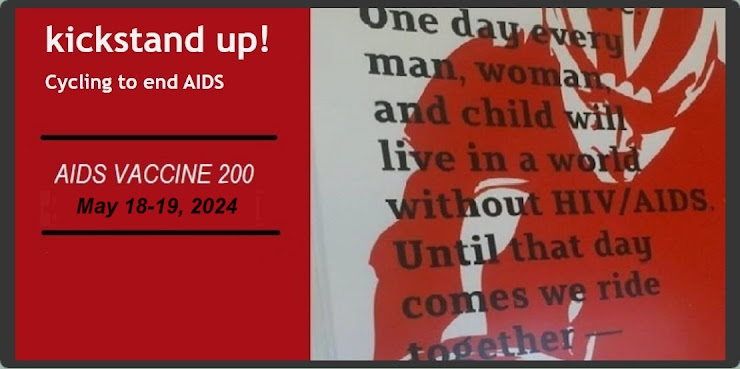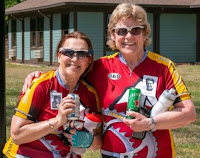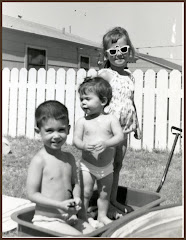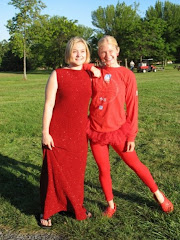THANK YOU!
The impact of your generosity to rid the world of HIV/AIDS is more evident than you might imagine. When I experience that impact, I wish you could hear it with my ears and see it with my eyes because I struggle to do it justice in the retelling though I will certainly try.
The Puget Sound Riders last travelled to Atlanta for the AIDS Vaccine 200 in 2019. We’d kept in touch and participated virtually through the COVID years but the time away had its influence on the ride and its participants. Only half of our usual team foursome was available to travel this year, had done very little road training and knew we’d struggle to finish each 100-mile day; we also knew that wasn’t our main objective. You gave. Steady donors and newcomers, family, friends, former teammates, and strangers gave like never before and kept giving through the weeks following our May event. So far, you’ve contributed to more than $140,000 for HIV/AID research at Emory Vaccine Center this year. Congratulations and thank you!
The roughly 150 people that gathered at Emory University for the 2022 AIDS Vaccine 200 were a humbler lot with far fewer strong racers and more relay participants. The tone had mellowed somewhere in the fog of a new pandemic that brought on reflections of the pandemic we still fight to live through; some have fought it a very long time. It’s now 27 years since the deaths of my brother, Bret, and my teammate Mary’s brother, Peter, and 25 years since Mary and I discovered that fact when we met on the start line of our very first cycling event to end AIDS. I think we knew then that our brothers had unfinished business with this virus, and we’d found a way to carry on their work.Bret never knew he had HIV. In the 80s, people hardly understood or could agree how the virus was transmitted. Bret was diagnosed on what should have been his deathbed in a Tokyo hospital; his HIV had already progressed to AIDS and he was lucky to survive that illness. By the kindness of his doctors, Bret able to slip out of Japan and sneak back into America since it was illegal to be in one and cross into the other with HIV. COVID travel restrictions brought those memories flooding back. Remember how anxious people were to get COVID travel restrictions lifted? The United States was one of the last developed countries in 2010 to lift its travel ban on those testing positive for HIV from entering the US. The ban had been in effect for 22 years.
Bret and I had an uncomfortable but necessary conversation about his final wishes at an airport fast food table in the middle of the night on our way to DC. Bret knew he was living on borrowed time and volunteered for every treatment trial available from a desire to help others and desperately wanted to donate his entire body to medical study at his alma mater, the University of Washington; they turned him down. He was devastated. The week after Bret died, I took a big box of leftover pills to his doctor, prepared to plead with him to give the drugs to someone who couldn’t afford them. Dr. Shalit gratefully accepted the pricey pills and did just that. A person infected with HIV today must remain diligent with their healthcare but can now count their daily medication regimen on one hand instead of by the handful.
The infrastructure built to study HIV, from the lab to global human trials is now highly regarded and utilized in collaborative health studies of many kinds – immunology, cancer, healthcare delivery and public policy to name a few. Last week I met the local bakery owner whose day job is scientific research on genetic variants that alter immune response and lead to an auto-immune disease. She admitted that as much as we all want HIV eradicated, her work is made easier by testing theories on the more dynamic HIV than on any other virus that attacks the immune system. The Emory Vaccine Center took pride in their contributions to the rapid development of COVID vaccines. Today’s message on how to recognize and avoid the spread of monkeypox is being delivered over communication channels that weren’t available 30 years ago and to ears that are now more accustomed to listening.
Bret didn’t want people to know he had AIDS because it would cause them to jump to the conclusion that he was gay - a social death sentence. Last month I made a trip to walk among the largest display of the AIDS Memorial Quilt in San Francisco history. Each of the 3,000 panels held the name of someone who died of HIV/AIDS; each told a story of a person who was loved, celebrated and missed. I made my way to a tent at the far end which was accepting new panels to be stitched into the quilt which now includes more than 50,000 individually sewn panels and 110,000 names. The back of the area was set up with several tables, scissors, needle, thread and piles of fabric panels – newly completed additions, starter background pieces for those wanting to get started and unfinished panels for volunteers to lovingly complete. A couple of those were laid out on tables surrounded by people who felt compelled to sit and stitch a while. I joined them. It was a mostly contemplative exercise periodically broken by someone lifting a memory, a sorrow, a hope. In the background was a steady flow of people in their 60s and 70s with an armful of fabric admitting something like “He needs to be included but I just couldn’t finish it”. We took the bundle from one person, laid it out on the table and 4 of us helped her finish the square in time for the formal
donation ceremony. In doing so, we learned about “Bear”, her friend and castmate
 |
| panel for Bear |
I’ve been honored to witness the results of your generous support over the past 25 years. Our progress is real and should be celebrated, yet our grasp on it remains tenuous. AIDS is not cured, HIV is still considered a global pandemic and hard-won laws can be too easily set aside, yet I remain hopeful every time I look back and see how far we have come. Maybe it’s time Bret had a quilt panel.














1 comment:
You are truly awesome. Great to read your July update. We are updating our site and will include your great work. Best, Allen
Post a Comment